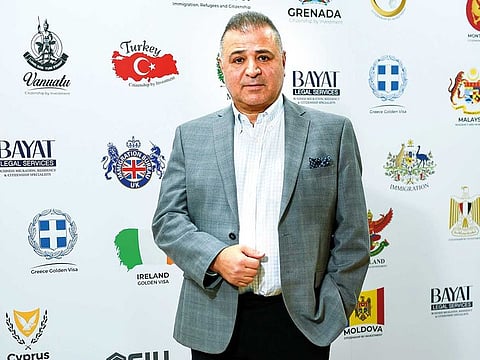Bayat Legal Services: "Ignorance is not a defence, an applicant must be aware of the law"
In conversation with Sam Bayat, Founder and Owner, Bayat Legal Services

Highlights
Sam Bayat, Founder and Owner, Bayat Legal Services talks to Sankar Sri Pillai about the heritage brand’s history while highlighting why transparency and playing by the rules is applicable to both consultants facilitating and applicants seeking immigration
When was Bayat Legal Services founded, what’s the ethos behind the brand?
Our trade licence was issued in December, 1993, and our operations started in Dubai in summer the same year. At Bayat Legal Services, we look at optimum results rather than settling for an acceptable solution. In the interests of my staff and the organisation, it’s also important for us at Bayat Legal Services to look into necessary precautionary measures. It’s important for me to look ahead in time and plan forward and prioritise what is really needed, and you can see that in our operations. For instance we look into the requirements of both our staff and clients by providing them a workspace where they can feel at ease, with bigger work rooms, bigger waiting areas and more.
As a world-class legal firm in business immigration and economic citizenship, how curated are Bayat Legal’s services, how do you differentiate from the competition?
We offer meaningful advice and benefits to clients, far beyond those that are available from traditional sources of immigration and second citizenship or visa service providers. Our extensive knowledge of different programmes enables us to properly advise our clients. Once the right path or programme is selected, it’s then up to our legal team, locally and affiliates to process the application. Our industry has commoditised immigration and citizenship and I have been a part of that but my primary role is to assist my clients, to determine what their needs are and to help them achieve their goals.
In light of the interview you recently gave to a media body based in the Caribbean last week, what are the factors applicants need to be aware of when applying for citizenship through real estate investment in the Caribbean nations?
An applicant must first be aware of the law as ignorance is not a defence, it is crucial that the applicant understands this. What I see most often, and this could apply to any programme is that applicants are signing forms before actually filling them. At Bayat Legal Services, we take the client through the entire form before filing and enquire whether they are okay with the particulars before they sign the document. I know of instances where other firms just get their clients to sign off on the last page and never share the details of the form. For instance, if a citizenship law of Dominica in the Caribbean mentions that a family of four must donate a sum of $200,000 to the government, or purchase a property for more than the aforementioned sum while planning to go through the citizenship by real estate investment route, how is it that there are consultants who request a payment of just $140,000 be made to avail of citizenship in the country? There is something wrong in this transaction. Through my article and every other time, I try to make it clear that a citizenship can be revoked if obtained through fraudulent means, so applicants need to think twice before opting for a shorter and cheaper route to fulfil their dreams.
Are there any new legal regulations in place or in the offing for the immigration sector considering the current pandemic situation?
Nothing has changed, the rules for citizenship and immigration remaining pretty much the same. Yes, St Kitts reduced its donation amount for citizenship by investment as did Dominica, this is official and the information is up on the respective government websites. I spoke to the CEO of St Lucia’s immigration programme earlier this week who confirmed that the numbers for immigration applications are up and greater than the same time last year, which proves in fact that the pandemic seems to have had a positive effect on the sector as well. What Covid has done is it’s forcing people to keep options open for a plan B or plan C, to look at factors other than the virus, say environmental issues for instance that could affect their migration plans. There is a lot more planning that applicants are doing before making the crucial decision to migrate.
Are you planning to expand Bayat Legal’s presence in the region? Could you share your expansion plans for the long term?
We are putting a lot of effort to expand our operations in Turkey as I feel their CBI offers an interesting immigration programme thanks to the liveability quotient associated with the country. Saudi Arabia is also a huge market and we have an office in Jeddah with plans to move a few full-time staff. I am also excited about India and visited Ahmedabad recently.
There is a lot of aspirational value associated with the newly rich in India, with interest being generated on second citizenship in the country and it makes sense to set up a base there too.
Sign up for the Daily Briefing
Get the latest news and updates straight to your inbox

